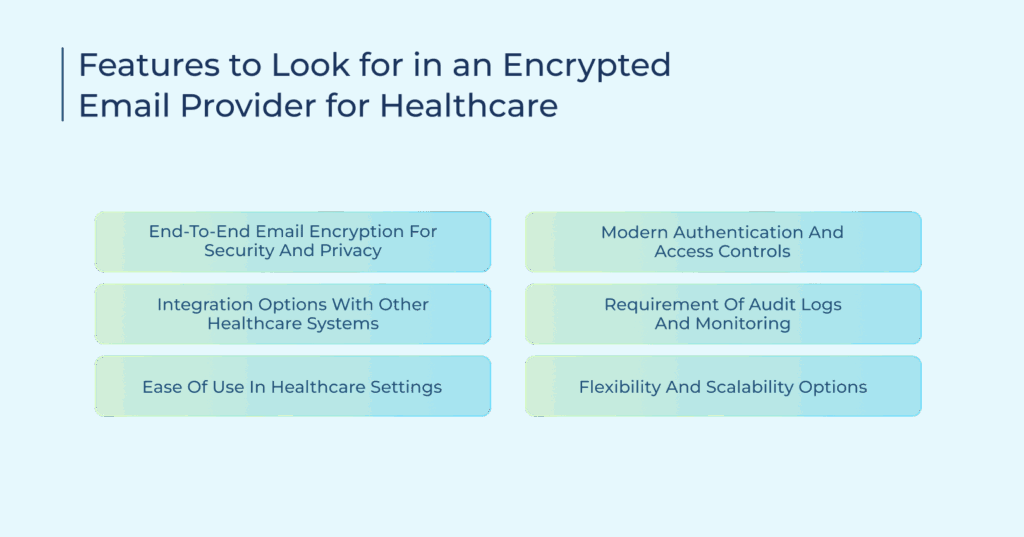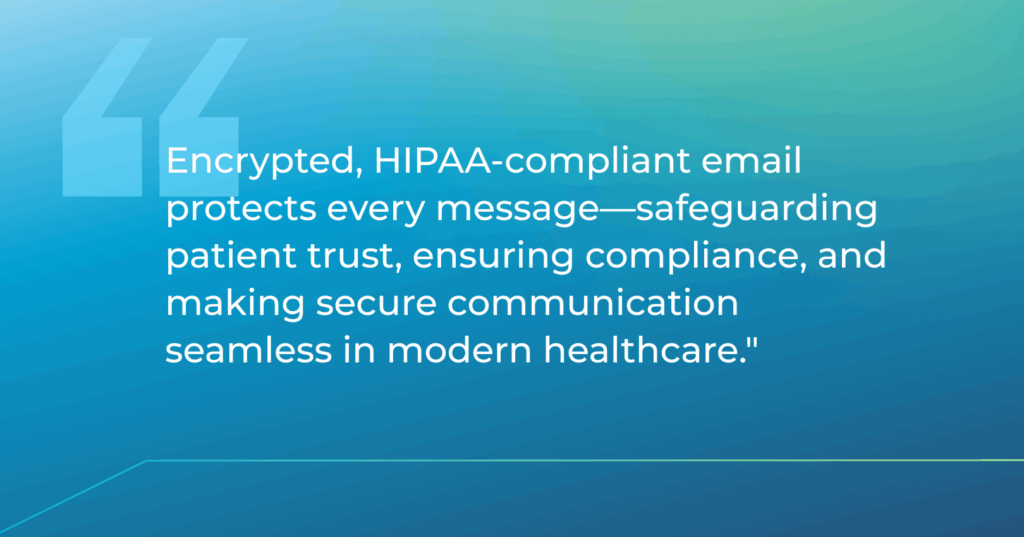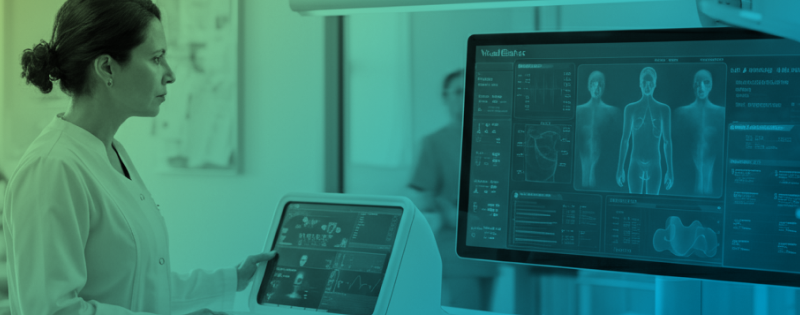Everyone working in the healthcare sector knows what it means when a message is either…

HIPAA-Compliant Encrypted Email for Secure Healthcare Communications
In healthcare, a single unsecured email can undo years of patient trust. Every message might carry a diagnosis, a treatment plan, or billing details. This is the kind of information that you can’t afford to fall into the wrong hands. It’s also why the healthcare sector is a gold mine for data breaches.
Hence, comes HIPAA messaging with its encrypted emails. It locks every message from the moment you hit send until it reaches the right person, keeping patient information private and your organization on the right side of the law.
The Need for Encrypted Emails in Healthcare
Healthcare is facing a full-blown data breach crisis. In 2024 alone, more than 275 million people had their personal health data stolen or disclosed without permission. For the healthcare industry, the average cost of such a breach is an eye-watering $9.8 million.
Nearly one in every five breaches under investigation that year was tied to email, highlighting the importance of pushing encrypted emails in healthcare.
The problem with regular email is that it leaves patient information completely exposed. Send a medical record, treatment plan, or billing detail without encryption, and it travels across the internet in plain text, just waiting for the wrong person to grab it. This is also a severe HIPAA violation.
HIPAA-compliant email encryption protects messages in transit so that only the intended recipient can read them. This means all your sensitive health information is kept out of sight. Let’s dive into that further and how it works.
What’s HIPAA-Compliant Encrypted Email?
HIPAA has laid out a complete process to help organizations encrypt their communications. Every message you send out is first encrypted, so even if someone intercepts your message, all they see will be gibberish content that makes no sense.
Let’s take an example. You write an email with a patient’s lab results. The encryption software automatically detects sensitive information and locks it down. The message travels through the internet in code. When your colleague opens it, the system unlocks the content using their unique key.
Secure email for healthcare requires specific technical standards. HIPAA mandates AES encryption with 256-bit keys. That’s on par with military-grade protection. Consumer email services can’t meet these requirements without additional security layers.
HIPAA-secure email providers also sign something called Business Associate Agreements. This means they legally promise to protect patient information and follow HIPAA rules. Regular email companies like Gmail or Outlook won’t sign these agreements because they can’t guarantee the security.
Importance of PHI (Protected Health Information) in Healthcare
PHI is any data that can identify a specific patient and relates to their health, treatment, or medical bills. This covers way more than most people realize.
HIPAA protects 18 specific patient identifiers. The obvious ones include names, addresses, and Social Security numbers. But it also covers medical record numbers, account numbers, birth dates, phone numbers, email addresses, and even photographs.
Healthcare emails are full of these identifiers. Appointment reminders include names and medical conditions. Lab result notifications contain diagnostic details. Insurance verification emails have policy numbers and coverage information. Even seemingly innocent messages often contain protected data.
Take note that HIPAA fines can reach over $2 million per incident. Criminal charges apply in cases of willful neglect. Beyond the money, data breaches destroy trust and reputation. Patients stop coming when they can’t trust you with their information.
Protecting patient information is how healthcare communication works in 2025.
Features to Look for in an Encrypted Email Provider for Healthcare
Shopping for HIPAA-secure email providers isn’t like picking a regular email. Healthcare has specific needs that most business email solutions can’t handle. You need something that keeps patient data safe while actually working in a busy medical environment.
Here’s what matters most when you’re evaluating options.

End-to-End Email Encryption for Security and Privacy
HIPAA-compliant email encryption is not easy to decrypt. Even if hackers intercept your message, they’d need supercomputers running for centuries to crack it.
You don’t even need to manage any of these technicalities. The system handles all the encryption keys and certificates automatically. Your staff just sends emails normally, while the security works behind the scenes.
Integration Options With Other Healthcare Systems
The best encrypted email for healthcare links right with your existing software. You shouldn’t have to switch between various programs just to send a secure message. If you use Epic, Cerner, Allscripts, or Practice Fusion, your email system ought to integrate directly.
This means you can send encrypted lab results straight from your EHR. Schedule appointments through secure email. Share patient information with specialists without copying and pasting between different applications.
Ease of Use in Healthcare Settings
Healthcare workers are extremely busy. They don’t have time to learn complicated security procedures. Hence, secure email for healthcare needs to work without training.
The best solutions don’t require recipients to install special software. When you send a secure message to a patient or referring physician, they should be able to read it through any web browser. They shouldn’t be forced to download any apps or create new accounts. Just a simple phone or email verification should do.
Additionally, using smart systems that automatically detect when you’re sending patient information means your staff can send emails the same way they always have. The compliance happens automatically.
Modern Authentication and Access Controls
Multi-factor authentication prevents hackers even if they steal your passwords. Most medical systems use ID badges, so employees can sign in with cards they already have. You can also use other authentications, such as phone or email OTPs.
Role-based controls also ensure individuals only have access to what they require. Nurses have access different than billing personnel. Specialists view their cases without viewing unrelated patient information. These limits extend to email, so individuals receive messages specific to their role.
Requirement of Audit Logs and Monitoring
HIPAA demands detailed records of who accessed what patient information and when. HIPAA-compliant email systems track everything. Who sent messages, who received them, when they were opened, and what actions people took.
These logs catch problems early. The system flags suspicious sending patterns, multiple failed login attempts, or access from strange locations. You get alerts about potential issues before they become major breaches.
During compliance audits, these logs prove you’re following HIPAA rules. They show exactly what happened if there’s ever a question about data handling.
Flexibility and Scalability Options
Healthcare organizations come in all sizes. A solo family practice has different needs than a 500-bed hospital. Hence, your email solutions need to grow with you without requiring complete overhauls. Small practices need affordable entry-level plans. Large health systems need enterprise features.
Deployment options matter too. Most providers are opting for cloud-based solutions because they are easy to set up and maintain. That’s in contrast to on-site installations that may require some degree of supervision, but they give you direct control over servers.
5 Best Encrypted Email Platforms for Healthcare Providers
When choosing a HIPAA-secure email provider, the wrong choice creates workflow disruptions, compliance headaches, and frustrated staff. The right choice, on the other hand, makes secure communication feel natural.
These five platforms stand out for healthcare organizations looking for a reliable, encrypted email for healthcare.
1. TeleVox
TeleVox is a trusted leader in digital patient engagement with secure messaging built in. Their solutions are trusted by more than 7,000 healthcare organizations and integrate seamlessly with electronic health record (EHR) systems. Their approach integrates secure communication into broader patient relationship management.
Key features:
- HIPAA-compliant messaging integrated with patient engagement tools
- EHR integration with major systems
- Web-based secure chat connecting patients directly to staff
- Omnichannel communication across multiple touchpoints
- AI-powered patient interaction capabilities
Best for: Health systems and larger practices that want secure messaging as part of comprehensive patient engagement.
2. Paubox
Paubox built its entire business around HIPAA-compliant email. Their system provides secure email for modern healthcare with easy setup, no portals or passcodes. Recipients don’t need special software or login credentials to read encrypted messages.
Key features:
- No recipient portals or password requirements
- Automatic encryption detection and application
- Direct integration with existing email systems
- Inbound email encryption for complete protection
Best for: Healthcare organizations that want encrypted email to work exactly like regular email, or who are tired of portal-based solutions that create friction for recipients.
3. LuxSci
LuxSci has provided HIPAA-compliant email, secure email encryption, and data protection since 1999. They offer the most customizable security settings among healthcare email providers, with options for different encryption levels and delivery methods.
Key features:
- Multiple encryption options (TLS, Escrow, PGP)
- Customizable security policies by recipient or content
- Enterprise-grade server infrastructure
- Advanced threat protection and filtering
- Secure forms and web hosting services
Best for: Healthcare enterprises with complex security needs and IT teams that require full control over security settings and encryption policies.
4. Hushmail
Hushmail targets smaller healthcare practices with straightforward, secure email for healthcare. They’ve focused on medical professionals for years, building features specifically for clinical communication needs.
Key features:
- Built-in encryption requiring no technical setup
- Electronic signatures for HIPAA forms
- Secure web forms for patient intake
- Mobile apps for iOS and Android
- Simple pricing structure for small practices
Best for: Small healthcare practices, solo practice physicians, and medical consultants who require simple encrypted email without advanced enterprise functionality.
5. Virtru
Virtru adds encryption to existing email platforms like Outlook and Gmail. They compete directly with Paubox for HIPAA email encryption software focused on compliance and control of PHI and PII. Their approach works within familiar email interfaces.
Key features:
- Plugins for Outlook, Gmail, and other email clients
- End-to-end encryption with sender control over messages
- Message recall and expiration capabilities
- Detailed audit logs and access controls
- Integration with Microsoft 365 and Google Workspace
Best for: Organizations heavily invested in Microsoft or Google email systems.
Are Email Providers Like Gmail and Outlook HIPAA Compliant and Secure?
Many healthcare organizations wonder if they can use Gmail or Outlook for patient communication. Both platforms are used globally by billions, but do not necessarily offer secure messaging in a healthcare setting.
Standard Gmail and Outlook aren’t compliant. The free versions of these services don’t provide the security controls or business agreements required for healthcare use.
Enterprise plans still lack sufficient encryption. Even with BAAs, standard business plans for Gmail and Outlook don’t automatically encrypt messages containing patient information.
Additional security measures are required. Healthcare organizations using these platforms need third-party encryption solutions, data loss prevention tools, and advanced access controls. These additions create complexity and additional costs that often exceed dedicated secure email for healthcare solutions.
Compliance gaps remain even with paid plans. Enterprise versions of Gmail and Outlook require careful configuration to achieve compliance. Many healthcare organizations incorrectly assume that purchasing business plans automatically provides HIPAA protection. Without proper setup, audit controls, and encryption policies, these platforms still expose patient data.
The complexity and ongoing management required to make Gmail or Outlook truly compliant often costs more than a dedicated encrypted email for healthcare solutions that work correctly from day one.
Why Choosing a Healthcare Specialized Solution is Important
General encrypted email providers handle security well, but they miss the unique needs of healthcare organizations. Healthcare-specific solutions understand medical workflows, compliance requirements, and patient communication patterns that generic encryption services don’t address.
Understanding healthcare workflows matters. General email encryption tools treat all industries the same, but healthcare solutions design features around how medical professionals actually work. TeleVox’s patient relationship platform, for example, integrates seamlessly with your EHR to support automated, personalized, two-way interactions with patients.
Built-in compliance reduces risk. Healthcare-focused HIPAA-secure email providers automatically handle regulatory requirements without additional configuration. They understand what qualifies as Protected Health Information and when encryption triggers are needed.
EHR integration saves time. This means sending secure emails without switching between applications. You save time and effort with every communication stream.
Healthcare-specific features provide value. Specialized solutions include electronic signatures for HIPAA forms, secure patient intake forms, and appointment scheduling integration. General encrypted email for healthcare tools focuses purely on message security without these workflow improvements.
Support teams understand healthcare needs. Healthcare-specialized providers have support staff familiar with medical terminology, HIPAA requirements, and clinical workflows. General encryption companies train their support teams for business users, not healthcare professionals.
HIPAA-compliant email encryption from healthcare-focused providers handles the complexity of medical communication while general encryption tools require healthcare organizations to figure out compliance details on their own.

Ensure Secure Patient Engagement and Communication for Patients With TeleVox
Your emails shouldn’t be a security gamble, especially when it concerns someone’s health and personal details. TeleVox leads the pack when it comes to HIPAA-compliant encryption, allowing both providers and patients to exchange sensitive information with complete confidence.
The robust safeguards carry over to our SMART Agent as well, so patients can get answers to routine questions or links to intake forms without sacrificing security.
It’s fast, seamless, and built to earn your patients’ trust. Schedule a demo today and see for yourself how secure communication can be effortless.



